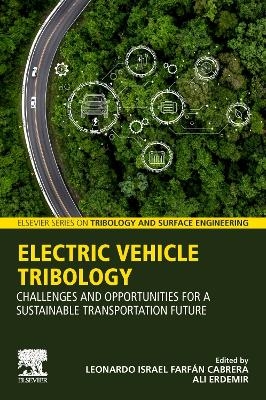
Electric Vehicle Tribology
Elsevier - Health Sciences Division (Verlag)
978-0-443-14074-7 (ISBN)
Dr. Leonardo I. Farfan-Cabrera is an Assistant Professor of automotive and mechanical engineering at Tecnologico de Monterrey in Mexico since 2018. He has been invited to be a visiting scholar by the University of Sheffield and Texas A&M University, working on the tribology of IC and electric vehicles, respectively. His PhD thesis “tribology of automotive components: cases of study was awarded the best PhD thesis price at the IPN in 2018. He has performed 4 keynote conference speeches, holds 1 patent and has written more than 40 papers in peer-reviewed journals. He is currently the head of the Laboratory of Automotive Tribology (E-Mobility) and received the awards “Inspiring Professor - 2021 and “Distinguished Professor 2020 and 2021 from Tecnologico de Monterrey. He is an Associate Editor of the journals “IMechE part J Journal of Engineering Tribology and “Mechanics and Industry and Guest Editor of the journal “Lubricants. Dr. Ali Erdemir is a Professor and Halliburton Chair in the Mechanical Engineering Department of Texas A&M University, USA, and worked at Argonne National Laboratory for over thirty years. Dr. Erdemir has received numerous coveted awards, including STLE’s International Award, ASME’s Mayo D. Hersey Award, JAST’s Distinguished Tribologist Award, the University of Chicago’s Medal of Distinguished Performance, six R&D 100 Awards, two Al Sonntag Awards and an Edmond E. Bisson Award from STLE. He was elected to the US National Academy of Engineering, European Academy of Sciences and Arts, World Academy of Ceramics, The Science Academy of Turkey, and the presidency of the International Tribology Council and STLE. He has authored/co-authored more than 300 research articles and 18 book chapters, co-edited four books, presented more than 200 invited/keynote/plenary talks, and holds 33 U.S. patents. His current research focuses on combining scientific principles and engineering innovations to develop super-hard and super-low-friction materials, coatings, and lubricants for applications in a variety of energy systems.
Introduction to Electric Vehicle Tribology
Part I: Sustainability of Electric Vehicles
1. Energy Use and Emissions of Electric Vehicles
2. Sustainability and Circular Economy of Electric Vehicles
3. Perspective on Green Materials for Electric Vehicle Production
Part II: Electric Vehicle and Tribology Fundamentals
4. Electric Vehicle Hardware, Systems, and Architecture
5. Electric Vehicle Tribological Components
6. Fundamental Principles of Friction, Wear, and Lubrication for Electric Vehicles
7. Lubricant Concepts for Electrified Vehicle Transmissions
8. Failure Types and Modes in Critical Electric Vehicle Tribological Components: Rolling Bearings
9. Fretting Wear of Critical Components in Electric Vehicles
10. Tribology of Electric Vehicle MEMS and NEMS
11. Triboelectrochemistry as applied to Electric Vehicles
12. Electric Vehicle Fluids: Types, Properties, and Requirements
13. Greases for Electric Vehicle Motors
14. Advanced Coatings for Electric Vehicles
Part III: Testing of Tribological Hardware, Materials, and Fluids from Electric Vehicles
15. Testing and Performance Evaluation of Electric Vehicle Powertrains
16. Tribological Test Methods for Lubricated Materials for Electric Vehicles
17. Electric Vehicle Powertrain Design and Testing
18. Testing and Evaluation of Oils and Greases for Rolling Bearings of Electric Vehicles
19. Advanced Techniques for Condition Monitoring of Electric Vehicle Components
20. Testing of Physicochemical Properties of Electric Vehicles
Part IV: Future Lubricant Developments for Electric Vehicles
21. Water-based Lubricants for Electric Vehicles
22. Ionic Liquids for Electric Vehicle applications
23. Esters in Cooling and Lubricating Electric Vehicle Transmission Systems
24. Nanolubricants for Electric Vehicles
25. New Fluids and Additives for Electric Vehicle Drivetrains
26. Environmentally-friendly Chemistries, including Lubricants from Plastic Waste
| Erscheinungsdatum | 01.06.2024 |
|---|---|
| Reihe/Serie | Elsevier Series on Tribology and Surface Engineering |
| Verlagsort | Philadelphia |
| Sprache | englisch |
| Maße | 152 x 229 mm |
| Gewicht | 530 g |
| Themenwelt | Naturwissenschaften ► Biologie ► Ökologie / Naturschutz |
| Technik ► Fahrzeugbau / Schiffbau | |
| ISBN-10 | 0-443-14074-X / 044314074X |
| ISBN-13 | 978-0-443-14074-7 / 9780443140747 |
| Zustand | Neuware |
| Haben Sie eine Frage zum Produkt? |
aus dem Bereich


